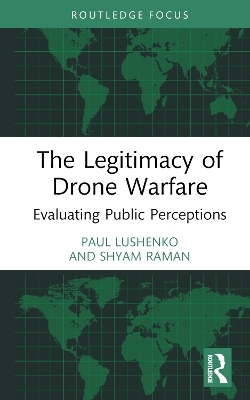
The Legitimacy of Drone Warfare
Evaluating Public Perceptions
Seiten
2024
Routledge (Verlag)
978-1-032-61428-1 (ISBN)
Routledge (Verlag)
978-1-032-61428-1 (ISBN)
This book examines public perceptions of the legitimacy of drones, and how this affects countries’ policies on and the global governance of drone warfare.
Scholars recognize that legitimacy is central to countries’ use of drones, and political officials often characterize strikes as legitimate to sustain their use abroad. This book introduces and tests an original middle-range theory that allows scholars, policy-makers, and practitioners to understand how evolving patterns of drone warfare globally shape the public’s perceptions of legitimacy that can moderate countries’ drone policies and the global governance of drones. Rather than relate drone warfare to a platform or counterterrorism strikes only, as experts often do, this book argues that drone warfare is best understood as a function of the unique ways that countries use and constrain strikes. By updating theories of drone warfare, this book provides a generalizable way to understand public perceptions of legitimacy in cross-national contexts, especially among democratic political regimes that are prefigured on political officials’ accountability for the use of force abroad.
This book will be of interest to students of security studies, foreign policy, media and communication studies, and International Relations.
Scholars recognize that legitimacy is central to countries’ use of drones, and political officials often characterize strikes as legitimate to sustain their use abroad. This book introduces and tests an original middle-range theory that allows scholars, policy-makers, and practitioners to understand how evolving patterns of drone warfare globally shape the public’s perceptions of legitimacy that can moderate countries’ drone policies and the global governance of drones. Rather than relate drone warfare to a platform or counterterrorism strikes only, as experts often do, this book argues that drone warfare is best understood as a function of the unique ways that countries use and constrain strikes. By updating theories of drone warfare, this book provides a generalizable way to understand public perceptions of legitimacy in cross-national contexts, especially among democratic political regimes that are prefigured on political officials’ accountability for the use of force abroad.
This book will be of interest to students of security studies, foreign policy, media and communication studies, and International Relations.
Paul Lushenko is an Assistant Professor and Director of Special Operations at the U.S. Army War College. Shyam Raman is a Visiting Assistant Professor at Williams College.
1. Public Opinion and Drone Warfare 2. Drone Warfare, Legitimacy, and Global Patterns of Strikes 3. The Legitimacy of Drone Warfare in Comparative Context 4. Unilateral Constraint and Public Perceptions of Legitimacy 5. Multilateral Constraint and Public Perceptions of Legitimacy 6. The Future of Public Opinion and Drone Warfare Studies
| Erscheinungsdatum | 30.01.2024 |
|---|---|
| Zusatzinfo | 10 Tables, black and white; 17 Line drawings, black and white; 17 Illustrations, black and white |
| Verlagsort | London |
| Sprache | englisch |
| Maße | 138 x 216 mm |
| Gewicht | 440 g |
| Themenwelt | Sozialwissenschaften ► Politik / Verwaltung ► Europäische / Internationale Politik |
| ISBN-10 | 1-032-61428-5 / 1032614285 |
| ISBN-13 | 978-1-032-61428-1 / 9781032614281 |
| Zustand | Neuware |
| Haben Sie eine Frage zum Produkt? |
Mehr entdecken
aus dem Bereich
aus dem Bereich
erfolgreiche Interessenvertretung durch Prozesskompetenz im komplexen …
Buch | Hardcover (2023)
Wiley-VCH (Verlag)
CHF 58,75
Studienbuch
Buch | Hardcover (2023)
De Gruyter Oldenbourg (Verlag)
CHF 62,90


